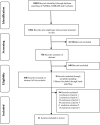Health outcomes measurement and organizational readiness support quality improvement: a systematic review
- PMID: 30594193
- PMCID: PMC6311059
- DOI: 10.1186/s12913-018-3828-9
Health outcomes measurement and organizational readiness support quality improvement: a systematic review
Abstract
Background: Using outcome measures to advance healthcare continues to be of widespread interest. The goal is to summarize the results of studies which use outcome measures from clinical registries to implement and monitor QI initiatives. The second objective is to identify a) facilitators and/or barriers that contribute to the realization of QI efforts, and b) how outcomes are being used as a catalyst to change outcomes over time.
Methods: We searched the PubMed, EMBASE and Cochrane databases for relevant articles published between January 1995 and March 2017. We used a standardized data abstraction form. Studies were included when the following three criteria were fulfilled: 1) they relied on structural data collection, 2) when a structural and comprehensive QI intervention had been implemented and evaluated, and 3) impact on improving clinical and/or patient-reported outcomes was described. Data on QI strategies, QI initiatives and the impact on outcomes was extracted using standardized assessment tools.
Results: We included 21 articles, of which eight showed statistically significant improvements on outcomes using data from clinical registries. Out of these eight studies, the Chronic Care Model, IT application as feedback, benchmarking and the Collaborative Care Model were used as QI methods. Encouraging trends in realizing improved outcomes through QI initiatives were observed, ranging from improving teamwork, implementation of clinical guidelines, implementation of physician alerts and development of a decision support system. Facilitators for implementing QI initiatives included a high quality database, audits, frequent reporting and feedback, patient involvement, communication, standardization, engagement, and leadership.
Conclusion: This review suggests that outcomes collected in clinical registries are supportive to realize QI initiatives. Organizational readiness and an active approach are key in achieving improved outcomes.
Keywords: Clinical registries; Improvement science; Quality improvement; Value-based healthcare.
Conflict of interest statement
Ethics approval and consent to participate
Not applicable.
Consent for publication
Not applicable.
Competing interests
The authors declare that they have no competing interests.
Publisher’s Note
Springer Nature remains neutral with regard to jurisdictional claims in published maps and institutional affiliations.
Figures

References
-
- Larsson S, Lawyer P. Improving health care value - the case for disease registries. 2011.
-
- Gliklich RE, Dreyer NA, Leavy MB. Registries for evaluating patient outcomes: a user’s guide. Rockville (MD): Government Printing Office; 2014. - PubMed
Publication types
MeSH terms
Grants and funding
LinkOut - more resources
Full Text Sources

